So far, the 2018/19 season has started just as the 2017/18 season ended, with Manchester City playing in a manner that suggests they will not be chased as they look to retain their grip on the Premier League trophy. Comfortable victories away to Arsenal and at home to Huddersfield Town had provided a sense of anticipation as they prepared for their third fixture of the season, away at newly-promoted Wolves.
There was a definite expectation around football that in spite of the investment in the first-team squad at Wolves over the last 18-24 months, this match would end in a comfortable victory for the champions.
In the event, Wolves came away from the match with a 1-1 draw and despite the seemingly fortuitous nature of their opening goal, defender Willy Boly handled the ball across the line, you would still be hard pushed to say that they did not deserve at the very least a point from this match.
Team News

With Manchester City lining up in their expected 4-3-3 shape, the onus would be on Wolves and their Portuguese coach Nuno Espirito Santo to find a way to not only contain the attacking threat posed by City but to find a way through their defensive structure to score.
Here was where things began to get interesting. Over the course of their promotion-winning season, last term, the most used structure and shape from Santo and his Wolves side was a 3-4-3 with Matt Doherty and Barry Douglas playing as extremely adventurous wing-backs with the licence to move into high areas of the field whenever Wolves were in the attacking phase. This match was the first that suggested that the tactical approach from Santo in the Premier League may be slightly more nuanced as they look to establish themselves as a top-flight side.
Whilst Wily Boly, Connor Coady and Ryan Bennett still formed a back three, this time Matt Doherty and Jonny Castro performed in a more defensively structured manner than we had seen previously from Wolves’ wing-backs as they formed a back five more often than not, whilst out of possession. In midfield, Ruben Neves and Joao Moutinho are both Portuguese internationals, although at different stages of their career, and the front three of Helder Costa, Diogo Jota and Raul Jiminez offered a combination of power and pace.
As we would see as the match progressed though the wide forwards, Helder Costa and Diogo Jota, performed more disciplined roles than we would perhaps have expected.
Compact Defensive Block
As the match got underway, it did not take long for City to set the tone as they dominated the ball, indeed they would go on, perhaps unsurprisingly, to dominate the possession battle in the match by 71% to 29%, but for all that they had possession of the ball, they lacked their characteristic ability to find quick combinations in the final third that would enable them to break down the Wolves defensive block. Instead, a lot of the possession was sterile, not a word that you would tend to associate with the normally incisive Pep Guardiola or his teams.
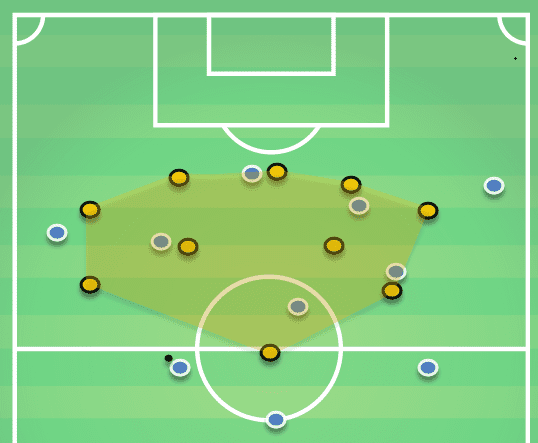
Here we have a graphic that shows the defensive structure from Wolves when City were in possession ahead of them. With Aymeric Laporte in possession of the ball at the halfway line, there were few, if any, passing options open to the man in possession. Wolves defensive structure saw Diogo Jota on the left and Helder Costa on the right drop in to form a chain of four across the middle which sat just ahead of the chain of five in the defensive line. Immediately in adopting this shape, Wolves were forcing City to play in front of them.
Any time that City did try to access the central areas of the final third, they were met with quick resistance, either in terms of the midfielders closing down passing lanes or with defensive players stepping out to put immediate pressure on the man taking possession of the ball.
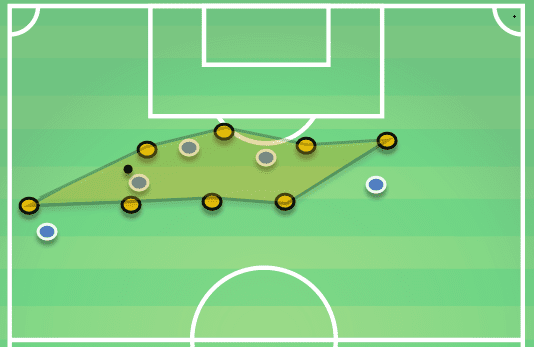
Even when City were able to work themselves into favourable situations around the final third, they still found the Wolves defensive block extremely hard to break down. The lines of the defence and midfield for Wolves were compact with little space in between for the City attackers to take up positions between the lines in order to force a central breakthrough. Even the exceptionally creative duo of David Silva and Bernardo Silva found it difficult to find and space away from the well-drilled Wolves defenders.
Normally, City under Pep Guardiola are one of the best teams in the World when it comes to finding these spaces in the final third and creating advanced platforms from which they can launch their attacking movements. In this game, most of the possession for City came in front of the Wolves midfield line.
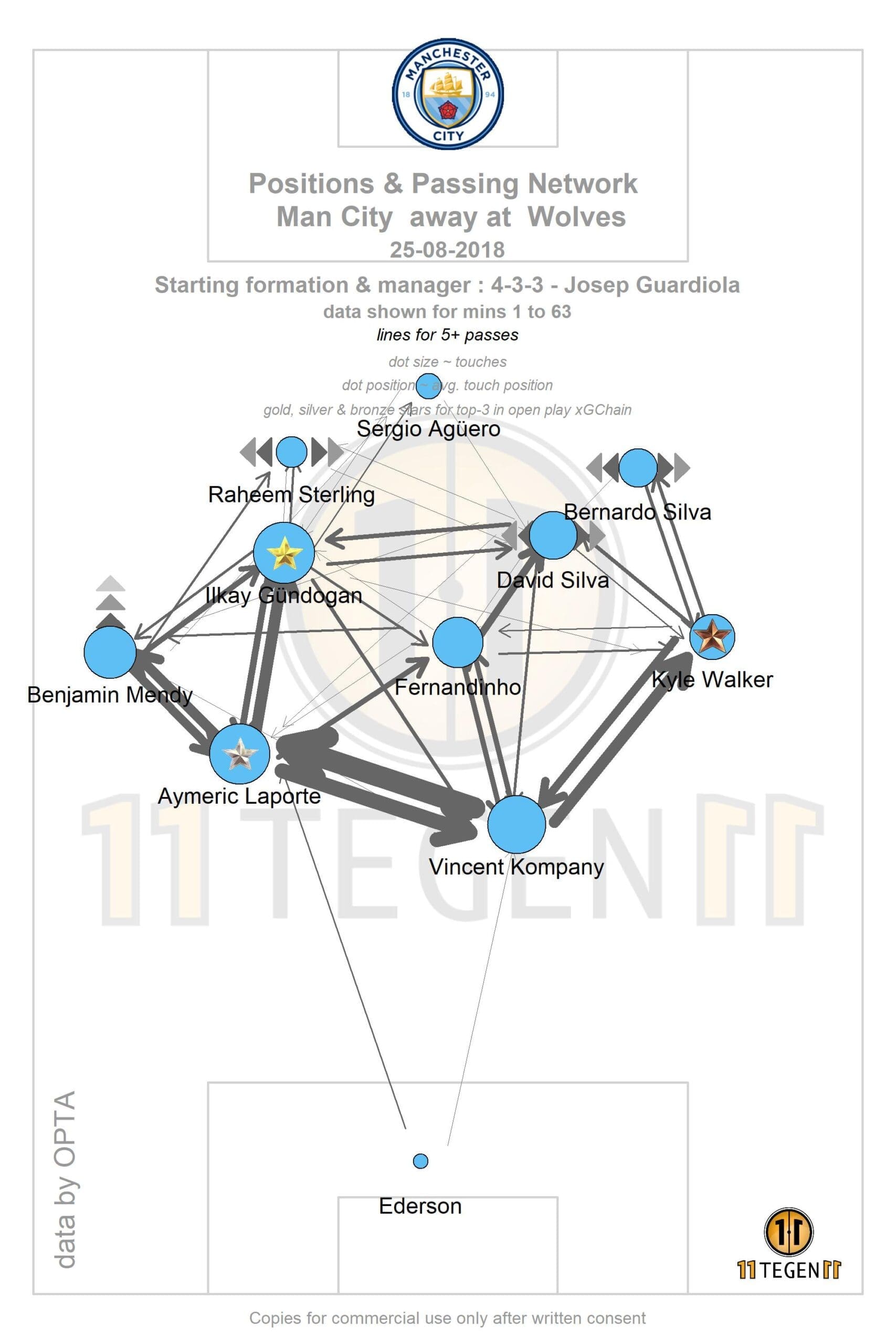
As you can see, despite the back seven for City, Laporte, Kompany, Walker, Mendy, Fernandinho, David Silva and Gundogan, enjoying a large success in terms of their passing connections, there was then a drop off in the possession enjoyed ahead of them by Raheem Sterling, Bernardo Silva and especially Sergio Aguero.
Wolves Defensive Cover
Whilst having a compact defensive unit is a strong place to start, there are times against a team of the quality of Manchester City that your defensive block will be breached, that was the case in this match but with City lacking their normal ruthless nature in front of goal, the three central defenders for Wolves were fantastic in providing cover for their defensive colleagues, time and time again.
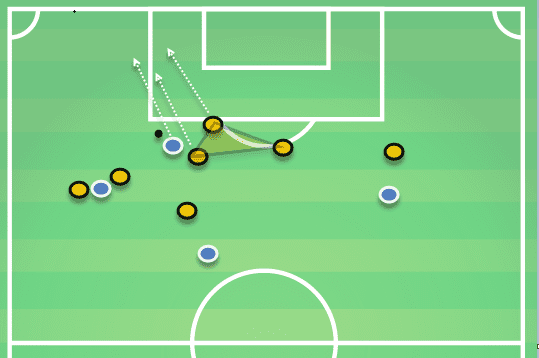
Here, the ball was fed into the feet of the normally deadly Sergio Aguero on the edge of the penalty area. Normally, the forwards’ first instinct would be to spin and head straight at goal but here he was blocked not only by Ryan Bennett marking him but by the free defender Connor Coady moving around to cover should Aguero manage to go past Bennett.
Instead, Aguero was forced out of the penalty area on the Wolves right side and he gave up possession easily.
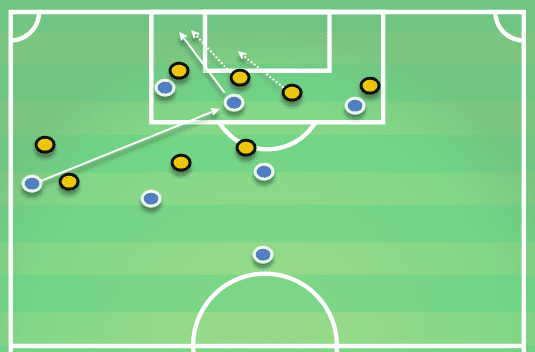
In most matches, the above sequence would have led to a goal. Manchester City excel at driving balls into the opposition penalty area before playing in quick combinations that see one of their wide players getting in behind the defensive line before looking for a cutback or a cross.
Once again, these movements were made much more difficult by the covering positions taken up by the ‘free’ man in the Wolves defensive line.
As Mendy drove the ball diagonally into the feet of Sergio Aguero, the forward would normally have two options, either a spin and shot or a quick pass ‘around the corner’ to find the wide player running in behind the defensive line. This time, however, as soon as the pass was made, Raheem Sterling was closely marked by Doherty and Bennett and Coady simply shifted across one slot each to crowd the City attack out.
Joao Moutinho
The signing by Wolves of the Portuguese international midfielder Joao Moutinho for a reported fee of £5M from AS Monaco may have been one of the deals of the season. Whilst his compatriot Ruben Neves is a midfielder full of potential he is yet to fulfill this potential. With that in mind, having a player as experienced as Moutinho partnering Neves in midfield has given Neves the platform from which he can thrive.
In this match, Moutinho was arguably the key player for Wolves with his ability to sit deep and play in the defensive block before using his experience in the transition to decide whether to hit the quick vertical pass or to slow the game down with short connecting passes.
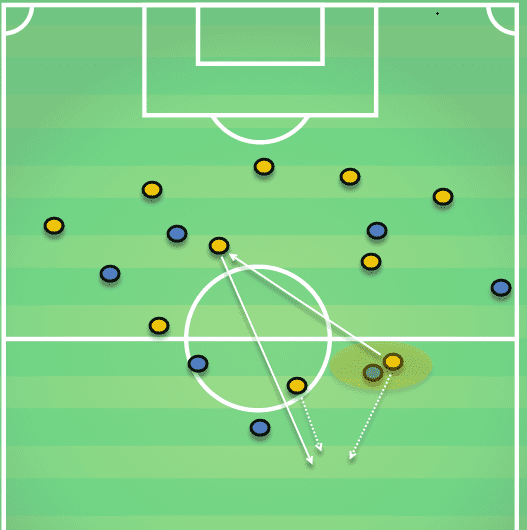
Here, we see a moment of transition for Wolves with Moutinho providing the incisive pass through to release the forward player. The opportunity to transition from defence to attack comes from a mistake by the City defender Vincent Kompany, who looks to drive out of defence in possession of the ball but is dispossessed by Diogo Jota pressing quickly.
As the ball breaks to Moutinho in the central area the City defensive structure is unbalanced and one vertical pass from Moutinho releases two Wolves attackers through on goal. Time and time again in this match, Moutinho was the key player in managing the transitions for his side and controlling the game plan from the centre of the field.

As you can see from this graphic, highlighting the key statistics from Moutinho in this match, he was extremely influential. Three tackles fail to take into account the number of times he would intercept the ball or break up play, going forward an 82% pass completion ratio along with 2 chances created and 1 assist shows us that Moutinho was influential in the attacking phase.
Conclusion
Whilst there is no doubt that Manchester City were far below their best at Molineux, you still cannot take away from the performance from Wolves.
More than anything else, this was a mature tactical performance in which the home side executed their coaches’ gameplan to perfection with a great defensive performance, combined with intelligent transitions.

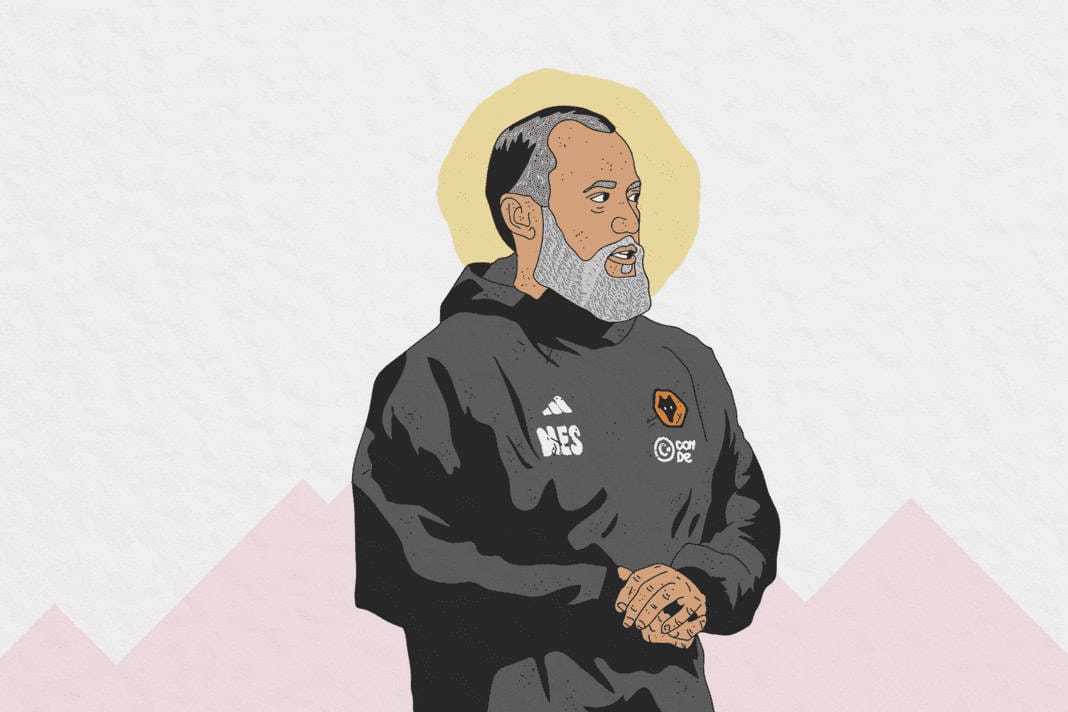

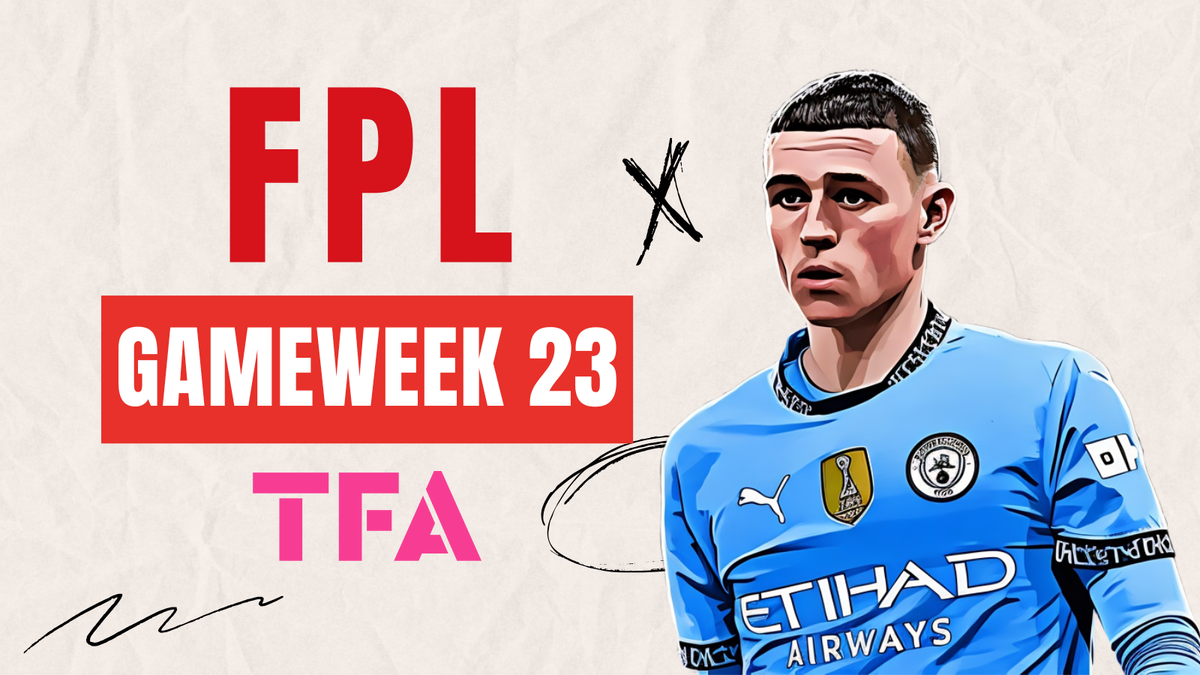
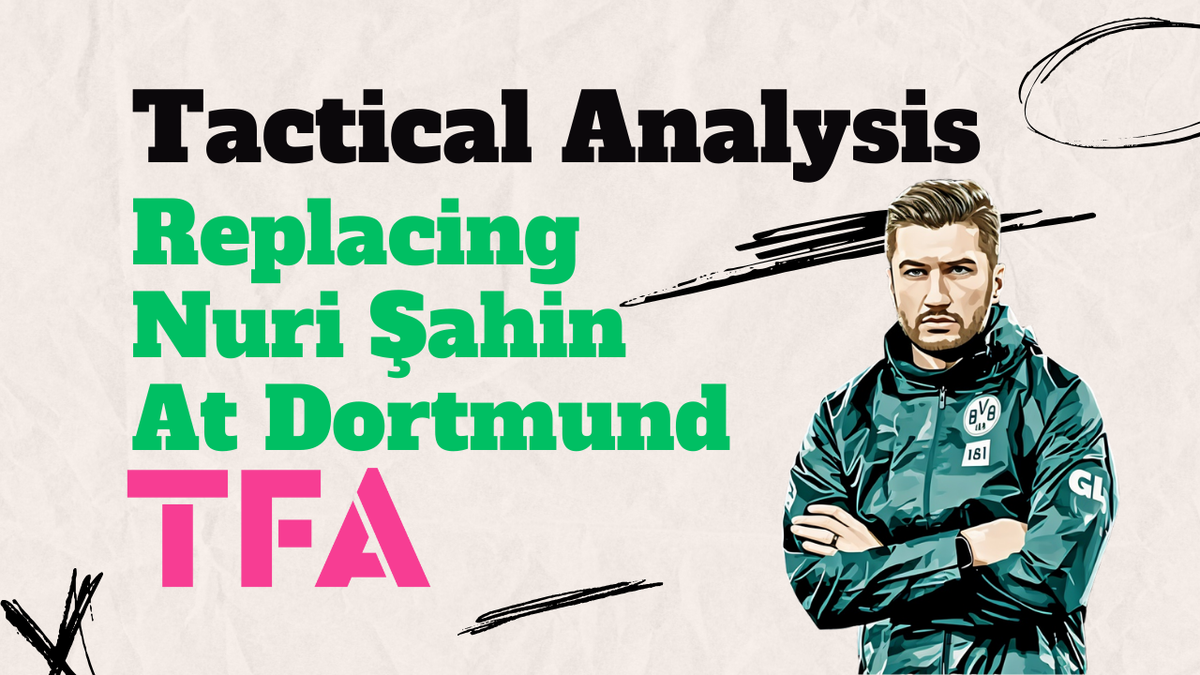
Comments